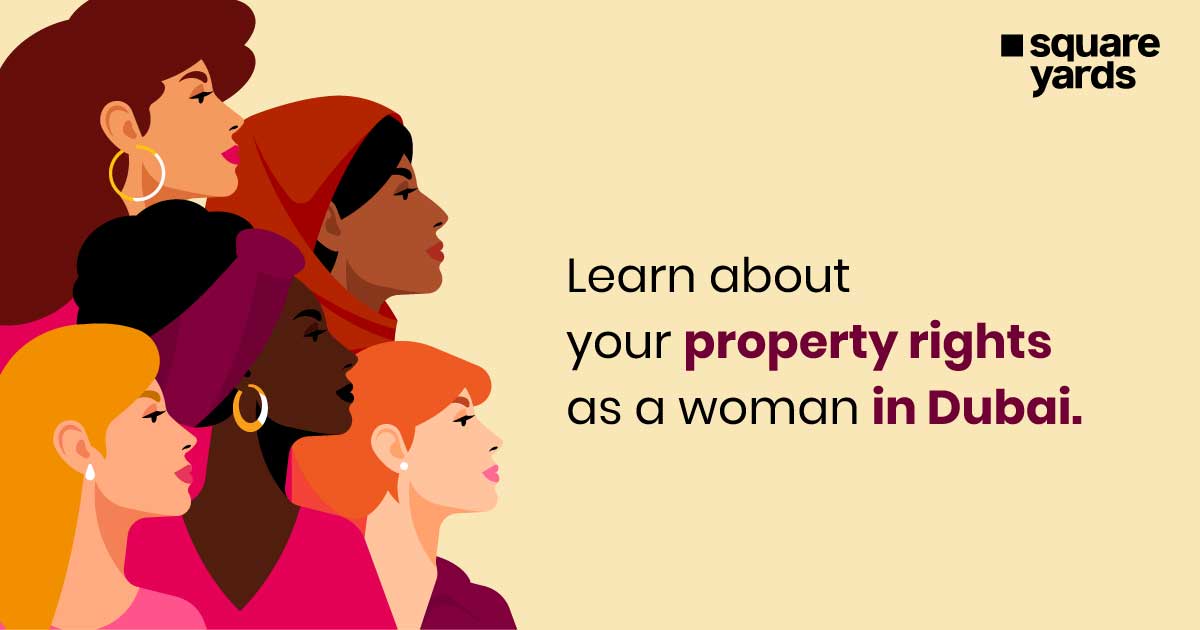Can women own property in Dubai, and if so, what are the unique considerations they face? Property ownership is not just a sense of independence, but a crucial occurrence of success and liberty. The United Arab Emirates has established its reputation for luxury and innovation and is now working progressively for the outlook on women’s rights. Any differences based on gender should not be tolerated, whether in terms of driving, opportunities or even in the case of owning your dream property. To implement the saying, the UAE government has imposed significant laws and regulations to support gender equality in all fields. Before diving into the property, let’s establish the broader context of rights of women in Dubai. While some traditional norms persist, significant strides have been made in recent years. This blog post delves deep into Dubai real estate, empowering women with the knowledge to navigate this exciting investment landscape.
Overview of Women Owning Property in Dubai
With the real estate sector witnessing a boost in UAE, the increase in women’s investment has led to increased confidence and interest in the real estate market. This progressive environment extends to property ownership, making Dubai a beacon for women seeking empowerment and security through real estate investment. The real estate sector has witnessed a significant transformation in the crucial domain of women’s property ownership. Now, an increasing number of women are playing a remarkable role in real estate investment. A report from the Dubai Land Department (DLD) has highlighted that real estate market investment by women has seen a rise of a whopping 50.8% in 2022, as compared to the previous year. The increase in female participation highlights the contribution of women to real estate development and expansion. According to a 2023 report from the Dubai Land Department, women’s contribution to the UAE’s property sector was around $16 billion.
The shift in policies has encouraged women to make informed decisions about their future. This was enabled by the introduction of initiatives like favourable regulations, streamlined processes, and providing support services to facilitate women’s participation. Hence, creating a secure and conducive environment for female candidates to explore and capitalise on the real estate sector is crucial. To conclude, the future of women’s investment in the property ownership market looks promising, with ample opportunities and continued growth.
Women Right’s in Dubai
Ranked as a leading country in gender equality, the UAE has taken essential steps to guarantee equal rights for men and women. This opens doors to financial independence, stability, and a sense of belonging in this dynamic city. Hence, to fight strongly against substantial gender discrimination, the imposed laws ensure that women are not left behind in any terms. Let’s explore the few rights to encourage the critical contributions of women in Dubai:
-
Voting Rights
Gone are the days when women used to fight for their basic right to vote and participate in the electoral process. Since 2006, Emirati women have enjoyed the right to vote and stand for election, actively shaping the nation’s political landscape. Women in Dubai have the right to vote and stand in municipal councils. Hence, sharing the power to decide the future of the Emirates and its communities. Interestingly, almost half of the percentage of voters are women. Thus, the introduction of these voting rights reflects Dubai’s commitment to promoting gender equality and empowering women in civic affairs.
-
Employment Rights

Dubai has witnessed a positive shift in the employment landscape for women, emphasising equal opportunities. With various initiatives and policies, the city has seen an increase in women joining the workforce. Women now constitute a major part of the Dubai workforce, with equal pay laws and anti-discrimination measures in place. Around 40% of the workforce today are women, and almost two-thirds of the public sector positions are filled by female candidates.
-
Educational Rights
Female literacy rates in Dubai are among the highest in the Arab world, with access to quality education at all levels. This region has achieved impressive literacy levels, with 95% of both men and women able to read and write. The education sector in Dubai has prioritised gender equality, ensuring that women have equal access to quality education. This dedication to educational rights has led to increased enrollment and achievements among women in various academic disciplines.
-
Entrepreneurship Rights
Women’s Business Council in Dubai has played a crucial role in fostering women’s entrepreneurship opportunities in Dubai. The government initiatives and policies have encouraged female candidates to promote a supportive environment contributing to the dynamic business landscape of the city. With the offering of mentoring programs, financial access, and networking opportunities, it has now become easy to promote their startups.
-
Property Rights

The legal system of the UAE guarantees full property ownership rights for acquiring mortgages to Emirati women. Interestingly, a recent study has highlighted the fact that women own around 30% of property in Dubai. Overall, Dubai actively encourages female entrepreneurship, with initiatives like the Dubai Women’s Establishment providing support and funding.
Inheritance Rights for Women Regarding Property in Dubai
Although the Dubai government gives full rights against selling and purchasing properties to women. There are laws that are slightly different for Muslim and non-Muslim women. Let’s understand the inheritance laws for women’s property ownership in Dubai.
-
MUSLIM WOMEN
Dubai grants equal rights to women to own, buy, and sell properties. While inheritance within Muslim families follows specific guidelines outlined in Sharia law, women have the right to specify their wishes through wills.
-
- In the absence of a will, daughters are entitled to share half of the son’s share.
- The inheritance share allocated to widows varies based on the family structure. In the absence of children, a widow inherits a quarter of her husband’s estate, while the presence of children decreases her share to an eighth.
- The husband has the right to share half of the property in case the wife dies without descendants.
- This family’s inheritance rules give daughters more when there are no sons. With no sons, daughters get double their usual share, and if there’s only one daughter, she gets the whole half to herself.
In simple terms, inheritance follows Sharia law, where daughters typically receive half the share of sons. However, women can write wills specifying alternative distributions, ensuring their wishes are respected.
-
Non-Muslim Women
For non-Muslim women, you are not bound by Sharia law and can freely distribute your property through a will, granting your heirs equal shares regardless of gender. The Federal Decree-Law No. 41 of 2022 on Civil Personal Status protects the rights of non-Muslim candidates for fair property ownership.
-
- Everyone inherits equally, regardless of whether they’re a boy or a girl.
- If a woman without a legal will dies, her partner is authorised for half of the share and children (irrespective of their gender) will inherit the other half. In case, if there are no children, the deceased father is entitled to the other half.
It’s crucial to understand these nuances and seek legal guidance to ensure your wishes are documented and protected.
Advantages of Women Possessing Property in Dubai

Investing in Dubai real estate goes beyond bricks and mortar; it’s a gateway to several advantages for women. Let’s take a look at some of the significant ones:
-
Economic Empowerment
Owning a property not only provides financial assistance but also gives a sense of independence. With Dubai’s vibrant and ever-growing population, women can enjoy consistent rental revenue year after round, creating a stable financial future for generations to come. Doesn’t matter if it’s a commercial, residential, or hospitality sector, women can seamlessly make real estate investments.
-
Legal Protection
All possible rights of women in Dubai are provided by Dubai’s legal system to guide through the property ownership process. The robust legal system offers equal rights to men and women, hence safeguarding the interests of both parties. It ensures your investment is protected and disputes are handled fairly.
-
Freedom of Choice
Owning your property grants you autonomy and control over your living space, empowering you to create a home that reflects your unique personality and needs. Additionally, investing in real estate might open up the doors for other women. Hence encouraging them to exercise their freedom of choice in terms of house or other resources.
Top Considerations for Women Regarding Property Ownership
When you are making one of the largest purchases of your life, you want to be sure it is secure, and protected and there are no issues. When it comes to buying property in Dubai, feeling confident and safe that the transaction is protected is not always easy. Worry not, here are some key tips to keep in mind:
-
Budgeting
When it comes to owning property in Dubai, women should prioritise budgeting to make informed decisions. Set realistic financial limits and factor in all associated costs, including maintenance, utilities, and potential property taxes. Establish a clear and realistic budget that considers not only the property cost but also additional expenses such as maintenance fees, utility bills, and potential renovations. This ensures financial stability and prevents unforeseen challenges in the future. Take advantage of financial planning tools and seek professional guidance to align your property investment with your long-term financial goals.
-
Location
Consider factors like proximity to essential amenities, public transport, and safety. Dubai offers diverse neighbourhoods, each with its key features and amenities. Research the neighbourhood’s development plans and property values over time to make an informed decision. A strategic location enhances the property’s value and contributes to a comfortable and convenient lifestyle.
-
Due Inspection
Before finalising any property purchase, conducting a thorough due inspection is paramount. Hire qualified professionals to assess the property’s structural integrity, inspect for potential issues, and review legal documentation. This step is essential in avoiding unforeseen complications and ensures that the property meets the required standards. One should not hesitate to ask questions and seek clarification during the inspection process.
Final Thoughts
UAE has positioned itself as the leading destination for female investors with its efforts to bridge the gender gap. With the rise in real estate investments, women get the benefits of building assets, generating income investments, and becoming financially independent. To conclude, the UAE government has taken various steps to empower women’s participation economically including real estate market.
Some More Useful Articles for You :
|
Know The Landlord Rights in Dubai |
|
|
Explore Women’s Museum Dubai |
|
|
Guide To Dubai Rental Market |
|
|
Rental Increase Notice in Dubai |
Frequently Asked Questions (FAQs)
It depends on the religious background of the woman and whether there’s a will in place.
Non-Muslim expats can register wills covering most personal assets and Dubai properties.
Yes, women enjoy full ownership rights in Dubai.
There are minimal legal restrictions on women compared to other parts of the region. However, some social norms may differ from Western cultures.
Yes, women can live independently in Dubai, rent apartments, and own property without requiring any male guardian.
Yes, Dubai offers a supportive and progressive environment for women. However, whether Dubai is good for you depends on your personal interests and priorities too. Who Will Inherit a Woman’s Property After Her Death?
What Can Non-Muslim Expat Women Register in Their Will in Dubai?
Can Women Own Property in Dubai?
What are the restrictions on women in Dubai?
Can a woman live alone in Dubai?
Is Dubai a good place to live as a woman?




